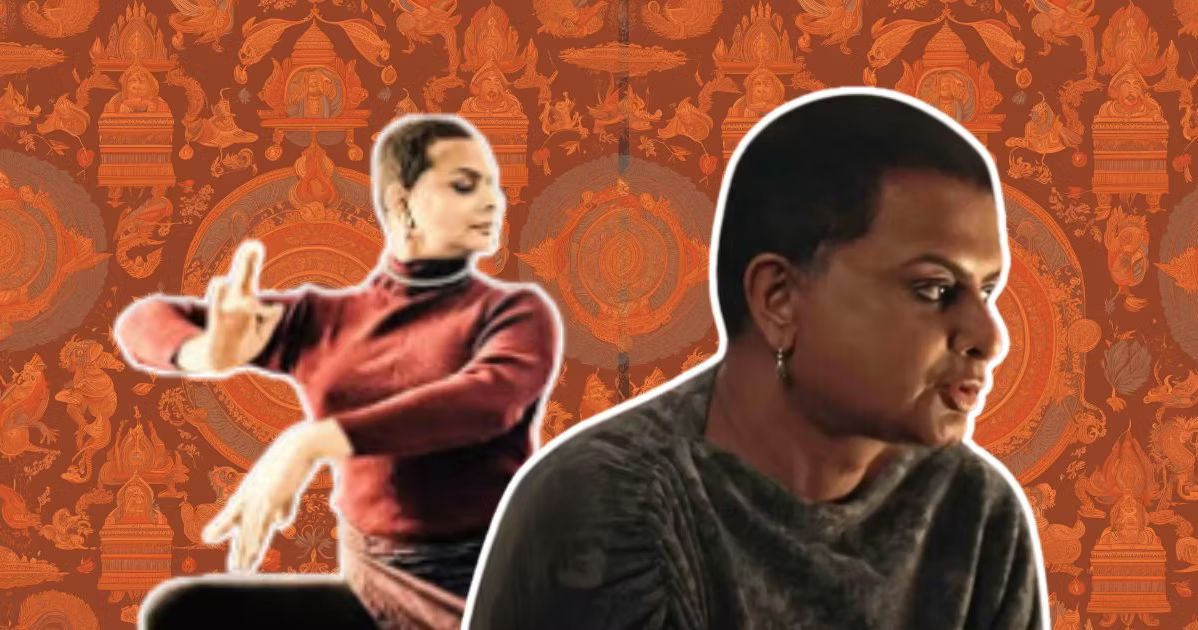In the epic tale of Mahabharata, Chitrangada was a warrior-princess who was brought up by her father, the king of Manipura, as a man. Rabindranath Tagore interpreted the story of this woman conflicted between gender roles in his dance-drama ‘Chitrangada’, in 1892. While in Mahabharata, it’s mainly about Arjuna’s exploits, Tagore gave centrality to the character of Chitrangada, and it was one of the very first Indian statements on gender equality.
120 years later, in a society that still fails to understand the meaning of gender equality and gender identity, this tale is retold on celluloid – created by an artist who changed Bengali cinema forever, Rituparno Ghosh. Adapting Tagore’s interpretation in today’s age, Ghosh highlights Chitrangada’s androgynous aspect and chose to treat the tale as one of a wish – a crowning wish.
What is a man or rather who? And who, for that matter, is a woman? Aren’t they just tiny ideas in the vast gender continuum we would like to conform to and live by and aspire to become?
This is precisely what the film explores.
Rituparno Ghosh
Rituparno himself plays the protagonist Rudra Chatterjee, a passionate choreographer-dancer, who is putting on a show based on Tagore’s ‘Chitrangada’, where he meets Partho and falls in love with him. There is a fine parallel drawn between the lives of Rudra and Chitrangada. Yes, with a drug addict as his partner and parents who see his sexual orientation as an illness yet are supportive, Rudra’s circumstances are of course different from that of Chitrangada. But isn’t the uncertainty he is made to feel about himself and the constant battle he goes through just to be accepted by those around him, exactly the same?
In an artistic twist to Tagore’s Chitrangada, Rudra questions the dilemmas and ontological insecurities the mythical and fictionalized Chitrangada may have undergone, the exclusion and marginalization she may have faced despite being the king’s child, and ponders over the gaps in the narrative.
Perhaps more than everything else, Chitrangada explores the loneliness of its talented and accomplished protagonist. Rudra decides to undergo a gender reassignment surgery only so that he and Partho can adopt a child (two male partners still cannot adopt children in India). Partho does not stop him but does not support Rudra either. When he is in the hospital, Partho starts a relationship with Kasturi. “If I want a woman, I will get a real one. Why should I settle for a synthetic one like you?”
Most of the scenes between Rudra and his parents take place across their dining table, and are ridden with conflict and guilt. Towards the end of the film, while Rudra is in the hospital, his father and mother have lunch without him. His mother says perhaps Rudra would have been happier if they had accepted him as he was, instead of trying to change his behaviour. “A boy will be like a boy, isn’t that natural?” says the father. “That which is one’s nature is natural to them,” replies the mother. This is a realization that escapes our society.
If there’s something that’s as complex as the mysterious workings of the cosmos – then it must be human relationships, and the underlying emotions at play. And Ghosh captured exactly these complexities, throughout his life, from celluloid to courtroom.
A National Award-winning filmmaker, a scriptwriter, an actor, a lyricist, an LGBTQ rights activist, a fashionista, a perfectionist – Ritu Da, as he was fondly called, wore many hats and with pride. And left behind a legacy that will live forever.
Brilliantly told through a series of conversations between Rudra and his therapist with excellent cinematography and editing, this film brings out these nuances of the ontological dilemma that a transperson faces, not being able to place himself in the binary gender categories created by society. Rudra’s journey is one of seeking liberation and realization through accepting oneself completely, much like what Chitrangada goes through in Tagore’s one-act play, and much like what Ghosh went through in his own life.
You know that thin line between the ‘right’ and the ‘wrong’ and the ‘truth’ and the ‘lie’? That grey area that suffocates us, but we cannot ignore? That is the area Ritu Da focused on. All those problematic areas, where the relationships entwine into an ugly tangle and we fail to categorize and put everything under water-tight compartments – that is the area he indulged in.
In biology, a flower with both male and female sexual organs is called the ‘perfect’ flower.
It is a shame that what constitutes perfection in the plant world should be treated as an anomaly, an aberration in the world of humans. However, in the end, both are linguistic attributions: perfection and imperfection exist because of language and culture, because of parameters that have been established and have gone to such immeasurable heights that they have blocked out the possibility of life and of existence beyond what they project. Chitrangada: The Crowning Wish is an effort to look beyond and within, simultaneously. And Ghosh’s life is an ode to love and liberation, to the beauty of being alive, just to suffer a little more.
ভালো থেকো, ঋতু দা।
(Ritu Da, stay well)
Aishwarya Roy
120 years later, in a society that still fails to understand the meaning of gender equality and gender identity, this tale is retold on celluloid – created by an artist who changed Bengali cinema forever, Rituparno Ghosh. Adapting Tagore’s interpretation in today’s age, Ghosh highlights Chitrangada’s androgynous aspect and chose to treat the tale as one of a wish – a crowning wish.
What is a man or rather who? And who, for that matter, is a woman? Aren’t they just tiny ideas in the vast gender continuum we would like to conform to and live by and aspire to become?
This is precisely what the film explores.
Rituparno Ghosh
Rituparno himself plays the protagonist Rudra Chatterjee, a passionate choreographer-dancer, who is putting on a show based on Tagore’s ‘Chitrangada’, where he meets Partho and falls in love with him. There is a fine parallel drawn between the lives of Rudra and Chitrangada. Yes, with a drug addict as his partner and parents who see his sexual orientation as an illness yet are supportive, Rudra’s circumstances are of course different from that of Chitrangada. But isn’t the uncertainty he is made to feel about himself and the constant battle he goes through just to be accepted by those around him, exactly the same?
In an artistic twist to Tagore’s Chitrangada, Rudra questions the dilemmas and ontological insecurities the mythical and fictionalized Chitrangada may have undergone, the exclusion and marginalization she may have faced despite being the king’s child, and ponders over the gaps in the narrative.
Perhaps more than everything else, Chitrangada explores the loneliness of its talented and accomplished protagonist. Rudra decides to undergo a gender reassignment surgery only so that he and Partho can adopt a child (two male partners still cannot adopt children in India). Partho does not stop him but does not support Rudra either. When he is in the hospital, Partho starts a relationship with Kasturi. “If I want a woman, I will get a real one. Why should I settle for a synthetic one like you?”
Most of the scenes between Rudra and his parents take place across their dining table, and are ridden with conflict and guilt. Towards the end of the film, while Rudra is in the hospital, his father and mother have lunch without him. His mother says perhaps Rudra would have been happier if they had accepted him as he was, instead of trying to change his behaviour. “A boy will be like a boy, isn’t that natural?” says the father. “That which is one’s nature is natural to them,” replies the mother. This is a realization that escapes our society.
If there’s something that’s as complex as the mysterious workings of the cosmos – then it must be human relationships, and the underlying emotions at play. And Ghosh captured exactly these complexities, throughout his life, from celluloid to courtroom.
A National Award-winning filmmaker, a scriptwriter, an actor, a lyricist, an LGBTQ rights activist, a fashionista, a perfectionist – Ritu Da, as he was fondly called, wore many hats and with pride. And left behind a legacy that will live forever.
Brilliantly told through a series of conversations between Rudra and his therapist with excellent cinematography and editing, this film brings out these nuances of the ontological dilemma that a transperson faces, not being able to place himself in the binary gender categories created by society. Rudra’s journey is one of seeking liberation and realization through accepting oneself completely, much like what Chitrangada goes through in Tagore’s one-act play, and much like what Ghosh went through in his own life.
You know that thin line between the ‘right’ and the ‘wrong’ and the ‘truth’ and the ‘lie’? That grey area that suffocates us, but we cannot ignore? That is the area Ritu Da focused on. All those problematic areas, where the relationships entwine into an ugly tangle and we fail to categorize and put everything under water-tight compartments – that is the area he indulged in.
In biology, a flower with both male and female sexual organs is called the ‘perfect’ flower.
It is a shame that what constitutes perfection in the plant world should be treated as an anomaly, an aberration in the world of humans. However, in the end, both are linguistic attributions: perfection and imperfection exist because of language and culture, because of parameters that have been established and have gone to such immeasurable heights that they have blocked out the possibility of life and of existence beyond what they project. Chitrangada: The Crowning Wish is an effort to look beyond and within, simultaneously. And Ghosh’s life is an ode to love and liberation, to the beauty of being alive, just to suffer a little more.
ভালো থেকো, ঋতু দা।
(Ritu Da, stay well)
Aishwarya Roy

